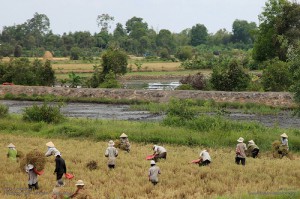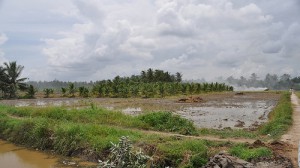In 2013 the Climate Change and Adaptation Initiative of The Mekong River Commission was developing its first report on the status of climate change in the Lower Mekong Basin. An important component of the Status Report would be the impact of climate change on the agricultural sector and the projected food situation in the Lower Mekong Basin. FutureWater contributed to this report, by providing an explorative outlook on crop production under climate change, and on food requirements and production under climate change. The analsyis was carried out for the 15 principal sub-basins of the Lower Mekong Basin, and for three future situations (foreseeable, long-term and horizon).
The Climate Change and Adaptation Initiative (CCAI) is a collaborative regional effort of MRC Member Countries (Lao PDR, Cambodia, Thailand and Vietnam) to support processes of adapting to the new challenges posed by climate change in the Lower Mekong Basin (LMB). The main focus is a basin wide integrated approach to adaptation planning consistent with Integrated Water Resources Management principles and within the Framework of the 1995 Mekong Agreement. The specific aim is to make adaptation a permanent part of development plans and planning process, and to have tools as well as institutional and specialist capacity in place to implement them.

The CCAI focuses on the following Outcomes: (1) climate change impact and vulnerability assessment, adaptation planning and implementation in priority locations within the LMB; (2) building knowledge and capacity at different levels (institutional, technical and managerial capacity); (3) regional adaptation strategy supporting national frameworks; (4) regional partnership and collaboration. Currently, the CCAI is developing its first “Status of Climate Change in the Lower Mekong Basin” report. An important component of the Status Report will be the impact of climate change on the agricultural sector and the projected food situation in the LMB.
Analyses on changes in crop production and food demand and supply have clear transboundary dimensions. Changes might be important in the context of imports and exports of agricultural products. Irrigation is an important consumer of water and changes in irrigated areas can have basin-wide consequences. A clear overview of expected changes in crop production and food demand and supply in the LMB is missing. Earlier initiatives are restrictive in terms of: local specific, encompassing only climate change, often based on old climate scenarios, and, most importantly based on different and not comparable approaches and assumptions.

FutureWater will contribute to the before mentioned report, by providing an explorative outlook on crop production under climate change, and on food requirements and production under climate change. The analsyis will be carried out for the 15 principal sub-basins of the Lower Mekong Basin, and for three future situations (foreseeable, long-term and horizon).
Gerelateerde publicaties
2014 - FutureWater Report
Past and Future Trends in Crop Production and Food Demand and Supply in the Lower Mekong Basin
Hunink, J.E., P. Droogers, K. Tran-Mai

